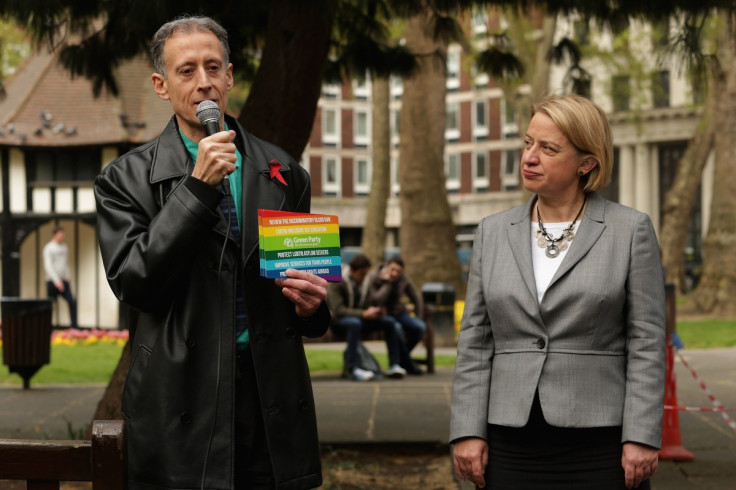Attempting to no-platform Peter Tatchell shows exactly what's wrong with today's students

It is impossible to completely agree with everything that someone else says. So having a specific point of contention with another person does not automatically mean that they are bigoted. And it is exactly this problem which has been stirring up controversy with regards to the nature of free speech in British universities recently.
Fran Cowling, the LGBT representative for the National Union of Students (NUS), was due to take part in a discussion on "Re-radicalising Queers" at Canterbury Christ Church University on Monday, but of her own accord decided not to take part due to the fact that Peter Tatchell, decades-long campaigner for LGBT rights, will be in attendance.
Her reasoning for this was that Tatchell signed an open letter in the Observer supporting free speech, in response to university student unions no-platforming speakers, such as Germaine Greer, due to their possibly problematic views. Cowling refused the opportunity to speak alongside Tatchell on the grounds that he is "racist" and "transphobic" – but these are baseless assertions that she appears to have failed to back up with evidence.
Cowling seems to have misunderstood what free speech means: defending someone's right to speak does not necessarily translate to agreeing with those views. Perhaps student union officers and their ardent followers should refrain from asking people to check their privilege and instead check their dictionary.
As a result of her decision to no-platform herself, she framed the debate before it had even begun as a dichotomy. She may not be speaking there, but her rhetoric is certainly damning, particularly of Tatchell and the pernicious insinuation that free speech threatens LGBT rights.
Her actions are indicative of the wider threat against free speech in today's universities, with students themselves actively refusing to engage in ideas contrary to their own.
In October 2015, the University of Manchester Students' Union banned Julie Bindel and Milo Yiannopoulos from a debate entitled "Does modern feminism have a problem with free speech?". We at the Manchester Free Speech Association decided to hold the debate instead to give the chance for the banned speakers to discuss the topic.
In February the Manchester Students' Union held their own version of Question Time with student representatives from political societies on campus sitting on the panel. One of the questions from the audience was whether there should be a safe space policy on campus, which was in reference to the Union banning the speakers previously.
Just like the Rhodes Must Fall movement at the University of Oxford which provoked supposed concerns of institutional racism and divided the student body on whether Cecil Rhodes' statue should be removed from campus, students are also divided here at Manchester on whether the safe space policy should remain or not (albeit on a smaller scale).
Ally Routledge, co-chair of the Manchester Labour Students, stated that Milo Yiannopoulos previously said that rape culture is a myth and that did not make her feel safe. Luke Dyks, the Chairman of Manchester Conservative Future responded by saying that she could "challenge" Yiannopoulos. Routledge replied that the students' union owes students a duty of care: "There is a difference between freedom of hate and freedom of speech, and freedom of hate is far more important than privileged people spouting their views all over the place".
All too often, students in elected positions resort to identity politics where a person's identity delegitimises their point of view as opposed to providing context from which they are speaking in.
Unfortunately, Cowling is not the only one who plays their range of oppression cards on the table as opposed to arguing their position with logical reasoning and well-reasoned arguments.
She had every right to refuse the chance to speak, but to echo Archie Bland's comments in the Guardian it is most certainly "her loss". The student representatives who are focused in their pursuit of equality should surely take up any chance to argue their case to counteract the supposed oppressive society that we live in.
But in their safe, ideal world, politically incorrect individuals should not be heard. Under this logic, by disparaging the character of the speakers' views and pointing out about how "abhorrent" they are, these opinions will simply disappear. That is not the case.
The British National Party did not collapse because people refused to engage with them; by allowing airspace for the party on national television people were allowed to form their own views and decide whether it was wrong or right for themselves. This can only be done if people point out the inconsistencies in other people's arguments to demonstrate how supposedly discriminatory their views are.
Were Cowling's actions conducive to the progression of LGBT rights? I don't think so. But the most unsettling thing about this is that this kind of censorial behaviour and thinking goes beyond a few representatives at universities today.
© Copyright IBTimes 2024. All rights reserved.






